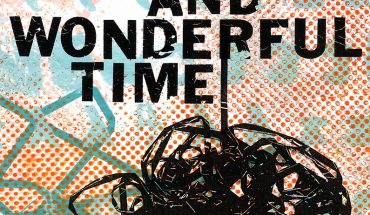A long-time music writer for The News & Observer, David Menconi’s new book shares an inside look at North Carolina’s music scene.
by Tracy Davis

David Menconi takes notes on his laptop while members of bluegrass band Town Mountain jam in the green room at Cat’s Cradle in 2018.
In his new book Step It Up & Go, David Menconi writes of North Carolina’s musical history–its story–and in doing so, brings his own story full circle. The book percolated in Menconi’s head for much of his almost three decades covering music and arts for The News & Observer, and draws on that trove of resources. It’s “basically a boxed set anthology of my time there,” he says, linked together by a common thread: Menconi’s abiding interest in and appreciation for the artists who make the music.
As a kid, Menconi was a devoted fan of Casey Kasem’s American Top 40, listening every weekend and tracking which bands were on the rise. He started writing about music early, reporting for the college paper while earning a bachelor’s degree in English at Southwestern University in Texas (this, after trying “all the well-paying majors”). In January of 1991, after getting his masters in journalism from the University of Texas at Austin and spending five years at the Daily Camera in Boulder, Colorado, he arrived in Raleigh as the music critic for The News & Observer. Once here, he put down roots.
If you’ve spent any time seeing live music or attending art exhibitions around town, you’ve seen Menconi in the crowd: pen and notebook in hand, sporting a distinctive mop of curls. He reported on the Triangle’s art and music scene for 28 years before retiring from The News & Observer last February.
Metro editor Thad Ogburn worked with Menconi for most of that time. “I’ve edited many of his stories through the years,” Ogburn says, “they always make me feel smarter.” Friends as well as former colleagues, Ogburn appreciates that Menconi used his journalistic platform “as intended—to inform and engage.” He sees Menconi as a natural ambassador and “a great guide, whether you know a lot or a little.”
While leaving the paper and colleagues that felt like family was wrenching for Menconi, he thinks his departure came at the right time. Journalism across the globe had transformed into a digital, “always-on” platform reliant on real-time reporting and online clicks—none of which comfortably co-exist with the kind of paper that lands with a pre-dawn thump. He misses that world. “When I talk about it, I still think of and refer to the paper as ‘we,’” he says, and “there is no better place to be than a newsroom when stuff is happening.” But he’s glad to be on the other side. “There are a lot more good memories than bad,” he says. “I greatly admire the people who stuck it out, and hats off to them.”
So in early 2019, Menconi dove back into Step It Up, which he’d worked on intermittently for years. In the introduction, he looks back to what he sees as the start of it all: a 1991 interview in Durham with Grammy award winner Alice Gerrard. As they talked, Gerrard played a record that included a 1929 recording by Clarence “Tom” Ashley, who performed throughout North Carolina with the likes of Doc Watson and the Carolina Tar Heels old-time band. For Menconi, the sound was a revelation—his “first inkling that this wasn’t just any other place.” The song sounded old as the hills and it also evoked echoes of Menconi’s new home of North Carolina. “A door opened,” Menconi writes, “so I went through it.”
“David was born to do this,” says Ogburn. “To come to this area, to write this book… The music of the state he was drawn to is central to his life.”
In Step It Up, Menconi gets his chance to plant his feet, dive into history, and tell the stories with sufficient space and ink to do them justice. He remembers a time when long-form journalism was more the norm, especially in magazines like No Depression, and was different from today’s norm, where musicians arrange interviews in tightly-scheduled increments and “just really want to get off the phone and to reveal as little of themselves as possible.”
Back then, journalists could build a story starting at an earlier point, when artists were flush with the act of creation and genuinely felt like telling you all about it. There were more opportunities for connection, he says, and for those “soul-sustaining moments of, this is why we do this.” He points to the 2002 release of Raleigh musician and artist Caitlin Cary’s first full-length solo album, as one such moment. “It’s always fun to talk to somebody when the record is new, before they’re all burned out, and they’re still excited about it, and under the spell of it,” he says. “Not that Caitlin’s ever been one of these jaded types, but there was sort of an optimism about it, and a freshness. And it was just such a good record.”
Even those tightly scheduled interviews could yield conversations that clicked, though. He fondly recalls an interview with folk legend James Taylor that concluded with Taylor saying, “I want to thank you. That was almost completely painless.” “I was happy with that,” Menconi says with a grin. “One of the proudest moments of my life.”
Musicians like Cary will always think of Menconi as part of the Triangle’s music family, and she appreciates his role in supporting the artists who make it. “You could absolutely feel his love of music, just seeing him in the crowd, and noticing the ways he pays attention,” she says. “And I’ve always admired what he does. If I had to go to a hardcore show and write about what it was everyone liked about it…” She trails off, mystified. John Teer, of Raleigh-based bluegrass outfit Chatham County Line, agrees. “In those very early days, you felt a real sense of community. There was such a diverse crowd and a real sense of ‘everybody’s welcome.’ I always felt that David was a big part of that. He’s a vital person in that scene.”
So, what’s next? He’s doing the freelance thing, and gearing up for his next book: the authorized history of Rounder Records, which “started as a hippie commune up in Cambridge some 50 years ago” and went on to become the biggest folk label of the past 50 years. The Rounder archives are housed at the University of North Carolina’s Wilson Library, so he’s looking forward to spending some time there.

Chatham County Line plays Wide Open Bluegrass at Red Hat Amphitheater in Raleigh, Saturday, Sept. 29, 2018.
Otherwise, Menconi is stuck inside like the rest of us. He’s watched summer lurch by from behind a window, and while he gets out for a walk every day, it’s “pretty much that and the grocery store.” The music scene is at a full hard stop, and artists he’s known for years are themselves in a state of anxiety-fueled reinvention. “I don’t know what arises out of the ashes,” he says, but he does see some bright spots. He points to Carrboro- based singer-songwriter Jonathan Byrd, who’s “done an incredible job reinventing himself” by hosting virtual songwriting workshops and a weekly online Americana residency with his band, the Pickup Cowboys. It’s all still unfolding, and he’s still following along.
He’s also started working alphabetically through his album collection and posting backstories and anecdotes on Facebook. It’s no surprise that Menconi has a lot of albums, and it took him two solid months just to get from A to B in his “Archive Deep Dive” posts, which started as just a “fun little exercise.” The posts are peeks into music lore and Menconi’s own head. A snippet from the A phase includes Laurie Anderson’s Big Science (“my personal narrator of doom when it comes to world-rocking calamities”); Andrew W.K.’s I Get Wet (“mook metal” that’s “good stupid fun”); Julie Andrews’ Best of Julie Andrews (“squeaky clean theatricality”); Angry Samoans’ The Unboxed Set (“how-low-can-you-go schtick”). The posts prompt a robust sharing of stories among commentators, and Ogburn’s enjoying it too. “Music transports us back to a certain point in time,” he says. “David appreciates that there’s a lot wrapped around a song.”
The posts also expand on Menconi’s personal conviction that pretty much everything is connected, one way or another. “It’s all one big story,” he says, “far flung though it is.”







Pingback: “Step It Up and Go” and the universal interconnectedness of all things | Losering Books